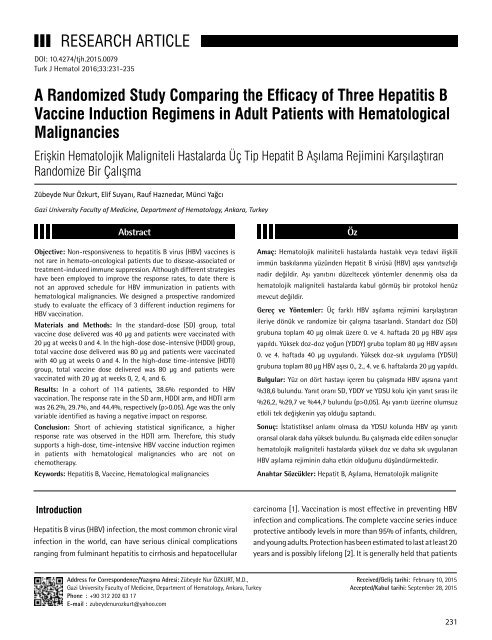Turkish Journal of Hematology Volume: 33 - Issue: 3
You also want an ePaper? Increase the reach of your titles
YUMPU automatically turns print PDFs into web optimized ePapers that Google loves.
RESEARCH ARTICLE<br />
DOI: 10.4274/tjh.2015.0079<br />
Turk J Hematol 2016;<strong>33</strong>:231-235<br />
A Randomized Study Comparing the Efficacy <strong>of</strong> Three Hepatitis B<br />
Vaccine Induction Regimens in Adult Patients with Hematological<br />
Malignancies<br />
Erişkin Hematolojik Maligniteli Hastalarda Üç Tip Hepatit B Aşılama Rejimini Karşılaştıran<br />
Randomize Bir Çalışma<br />
Zübeyde Nur Özkurt, Elif Suyanı, Rauf Haznedar, Münci Yağcı<br />
Gazi University Faculty <strong>of</strong> Medicine, Department <strong>of</strong> <strong>Hematology</strong>, Ankara, Turkey<br />
Abstract<br />
Objective: Non-responsiveness to hepatitis B virus (HBV) vaccines is<br />
not rare in hemato-oncological patients due to disease-associated or<br />
treatment-induced immune suppression. Although different strategies<br />
have been employed to improve the response rates, to date there is<br />
not an approved schedule for HBV immunization in patients with<br />
hematological malignancies. We designed a prospective randomized<br />
study to evaluate the efficacy <strong>of</strong> 3 different induction regimens for<br />
HBV vaccination.<br />
Materials and Methods: In the standard-dose (SD) group, total<br />
vaccine dose delivered was 40 µg and patients were vaccinated with<br />
20 µg at weeks 0 and 4. In the high-dose dose-intensive (HDDI) group,<br />
total vaccine dose delivered was 80 µg and patients were vaccinated<br />
with 40 µg at weeks 0 and 4. In the high-dose time-intensive (HDTI)<br />
group, total vaccine dose delivered was 80 µg and patients were<br />
vaccinated with 20 µg at weeks 0, 2, 4, and 6.<br />
Results: In a cohort <strong>of</strong> 114 patients, 38.6% responded to HBV<br />
vaccination. The response rate in the SD arm, HDDI arm, and HDTI arm<br />
was 26.2%, 29.7%, and 44.4%, respectively (p>0.05). Age was the only<br />
variable identified as having a negative impact on response.<br />
Conclusion: Short <strong>of</strong> achieving statistical significance, a higher<br />
response rate was observed in the HDTI arm. Therefore, this study<br />
supports a high-dose, time-intensive HBV vaccine induction regimen<br />
in patients with hematological malignancies who are not on<br />
chemotherapy.<br />
Keywords: Hepatitis B, Vaccine, Hematological malignancies<br />
Amaç: Hematolojik maliniteli hastalarda hastalık veya tedavi ilişkili<br />
immün baskılanma yüzünden Hepatit B virüsü (HBV) aşısı yanıtsızlığı<br />
nadir değildir. Aşı yanıtını düzeltecek yöntemler denenmiş olsa da<br />
hematolojik maligniteli hastalarda kabul görmüş bir protokol henüz<br />
mevcut değildir.<br />
Öz<br />
Öz<br />
Gereç ve Yöntemler: Üç farklı HBV aşılama rejimini karşılaştıran<br />
ileriye dönük ve randomize bir çalışma tasarlandı. Standart doz (SD)<br />
grubuna toplam 40 µg olmak üzere 0. ve 4. haftada 20 µg HBV aşısı<br />
yapıldı. Yüksek doz-doz yoğun (YDDY) gruba toplam 80 µg HBV aşısını<br />
0. ve 4. haftada 40 µg uygulandı. Yüksek doz-sık uygulama (YDSU)<br />
grubuna toplam 80 µg HBV aşısı 0., 2., 4. ve 6. haftalarda 20 µg yapıldı.<br />
Bulgular: Yüz on dört hastayı içeren bu çalışmada HBV aşısına yanıt<br />
%38,6 bulundu. Yanıt oranı SD, YDDY ve YDSU kolu için yanıt sırası ile<br />
%26,2, %29,7 ve %44,7 bulundu (p>0,05). Aşı yanıtı üzerine olumsuz<br />
etkili tek değişkenin yaş olduğu saptandı.<br />
Sonuç: İstatistiksel anlamı olmasa da YDSU kolunda HBV aşı yanıtı<br />
oransal olarak daha yüksek bulundu. Bu çalışmada elde edilen sonuçlar<br />
hematolojik maligniteli hastalarda yüksek doz ve daha sık uygulanan<br />
HBV aşılama rejiminin daha etkin olduğunu düşündürmektedir.<br />
Anahtar Sözcükler: Hepatit B, Aşılama, Hematolojik malignite<br />
Introduction<br />
Hepatitis B virus (HBV) infection, the most common chronic viral<br />
infection in the world, can have serious clinical complications<br />
ranging from fulminant hepatitis to cirrhosis and hepatocellular<br />
carcinoma [1]. Vaccination is most effective in preventing HBV<br />
infection and complications. The complete vaccine series induce<br />
protective antibody levels in more than 95% <strong>of</strong> infants, children,<br />
and young adults. Protection has been estimated to last at least 20<br />
years and is possibly lifelong [2]. It is generally held that patients<br />
Address for Correspondence/Yazışma Adresi: Zübeyde Nur ÖZKURT, M.D.,<br />
Gazi University Faculty <strong>of</strong> Medicine, Department <strong>of</strong> <strong>Hematology</strong>, Ankara, Turkey<br />
Phone : +90 312 202 63 17<br />
E-mail : zubeydenurozkurt@yahoo.com<br />
Received/Geliş tarihi: February 10, 2015<br />
Accepted/Kabul tarihi: September 28, 2015<br />
231

















